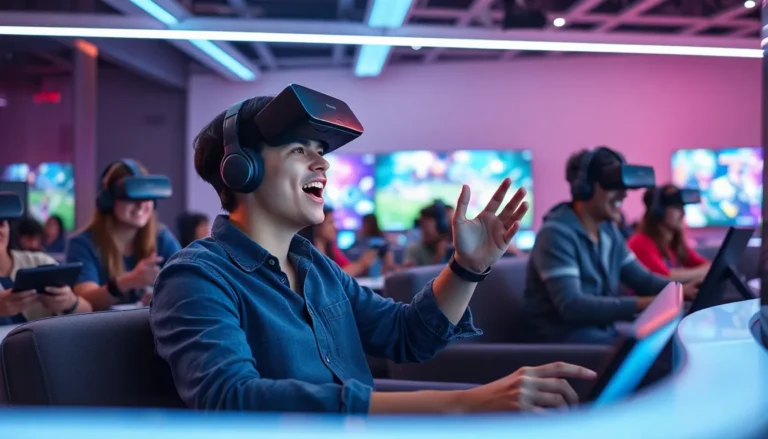Table of Contents
ToggleIn the world of console gaming, achievements are the shiny trophies that make players feel like champions. They’re not just digital badges; they’re the bragging rights that turn casual gamers into legends among their friends. Who wouldn’t want to strut around with a virtual trophy case that screams, “I conquered that game faster than you could say ‘game over’?”
Overview of Console Gaming Achievements
Console gaming achievements act as digital milestones that enhance the gaming experience. Players encounter these challenges as they navigate through various titles, completing specific tasks or reaching certain levels. Tracking progress through achievements fosters motivation and engagement, encouraging gamers to explore all aspects of a game.
Many consoles, such as PlayStation and Xbox, incorporate achievement systems into their platforms. Achievements vary in difficulty and type, from easy-to-obtain accolades to those requiring significant skill or time investment. Earning these achievements often leads to a sense of fulfillment, redefining a player’s journey within a game.
Various titles showcase unique achievements that reflect their core gameplay mechanics. Some games emphasize speed runs, while others reward exploration or completion of side quests. These challenges align with the player’s interests, enhancing immersion and satisfaction.
Social aspects play a crucial role in achievements. Players often share their accomplishments on social media or within gaming communities, creating a strong sense of camaraderie. As gamers compare their trophy cabinets, friendly competition emerges, driving players to improve their skills.
Overall, console gaming achievements serve more than a cosmetic purpose. They enrich the gaming landscape by motivating players, fostering community, and enhancing personal achievement. Different platforms and games contribute to an ever-expanding collection of accomplishments that reflect the evolving nature of gaming culture.
Importance of Achievements in Gaming

Achievements play a crucial role in console gaming. Players find motivation through these milestones, which enhance their gaming experience.
Enhancing Player Engagement
Players engage more deeply when achievements are present. Each completed task feels rewarding. Achievement systems reward specific goals and milestones, prompting players to invest more time in games. Many gamers take pride in their achievements, using them to showcase their skills. Online platforms allow sharing accomplishments, strengthening connections within gaming communities. Players often seek strategies or tips to unlock achievements, fostering discussions and knowledge sharing.
Encouraging Exploration and Mastery
Exploration becomes vital as players chase unique achievements. Many games incorporate challenges tied to primary mechanics, leading players to discover hidden features. Each achievement encourages a thorough understanding of the game’s environment. Mastery is attained by completing varied tasks, pushing players to refine their skills. Several achievements require collaboration or advanced techniques, promoting teamwork among players. Challenges linked to exploration and mastery enhance overall enjoyment of games, motivating players to delve deeper into the gaming world.
Major Platforms and Their Achievement Systems
Achievement systems vary across major gaming platforms, influencing player engagement and experience significantly. The primary platforms include Xbox, PlayStation, and Nintendo, each with distinct approaches toward achievements.
Xbox Achievements
Xbox introduced achievements in 2005, aiming to enhance player interaction. Players earn Gamerscore by completing various tasks, with some achievements tied to specific games and others linked to overall gaming behavior. These digital badges motivate players to explore game mechanics thoroughly. Achievements range from simple tasks to complex challenges, offering a fulfilling sense of accomplishment. Community features enable players to showcase their Gamerscore, fostering competition and camaraderie among friends.
PlayStation Trophies
PlayStation adopted a trophy system in 2008, categorizing achievements into four tiers: Bronze, Silver, Gold, and Platinum. Each trophy reflects the difficulty and effort required to achieve it, incentivizing players to strive for higher-tier trophies. Unlocking trophies enhances a player’s profile visibility, encouraging skill display among peers. Many PlayStation games feature unique challenges that promote engagement. The trophy system cultivates conversations within gaming communities as players share strategies on obtaining elusive trophies.
Nintendo Achievements
Nintendo’s approach to achievements differs, focusing on rewarding gameplay rather than traditional achievement systems. While the Nintendo Switch lacks a formal achievement system, games like Super Mario Odyssey award players through unique challenges and collectibles. Players experience fulfillment by completing in-game objectives and achieving high scores. Although not formalized, these rewards enhance community interaction and player investment in games. Nintendo fosters exploration and creativity, encouraging players to engage deeply with their titles.
Impact of Achievements on Gamers
Console gaming achievements significantly influence player behavior and community dynamics. They create a culture that emphasizes goal-oriented gameplay and shared experiences.
Achievement Hunting Culture
Gamers often engage in achievement hunting, where they pursue specific goals to complete their collection. This aspect of gaming encourages players to explore every corner of a game. Players can unlock hidden content or discover unique gameplay mechanics through dedicated effort. Achievements serve as markers of progress, with many gamers feeling satisfaction upon earning difficult tasks. By engaging in this culture, players enhance their skills and deepen their understanding of games. Every completed achievement adds to their account, fostering a sense of accomplishment.
Social Connections and Competitions
Achievements also foster social connections among gamers. Online leaderboards encourage competition, allowing players to compare their progress with friends. This competitive environment promotes camaraderie, as gamers often share tips and strategies for earning achievements. Discussions around trophy hunting ignite community engagement on platforms like forums and social media. Friendly rivalries can develop, motivating players to improve their gaming skills. Players can bond over shared achievements, creating connections that transcend individual gameplay experiences. Gaming communities thrive through this interplay of competition and cooperation.
Console gaming achievements have transformed the gaming experience into something more engaging and rewarding. They not only motivate players to push their limits but also foster a sense of community among gamers. Through the pursuit of these digital trophies, players connect over shared goals and experiences, enhancing their overall enjoyment of games.
As the gaming landscape continues to evolve, achievements will likely play an even more significant role in shaping player interactions and experiences. They represent a blend of competition and collaboration that enriches the gaming culture, making every victory feel more meaningful. Ultimately, achievements are more than just points; they’re a celebration of skill, dedication, and community within the gaming world.







